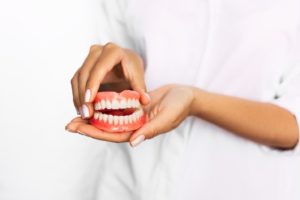
Eating is something that humans must do in order to stay alive. However, it is much more than an act of survival. It can be a joyful, comforting experience. Whether you are savoring a juicy steak or indulging in a sweet dish of ice cream, consuming your favorite treats is truly something to enjoy. But what if you find that, after getting dentures, you cannot taste foods like you used to? This blog post discusses the relationship between dentures and taste in Belmont and provides suggestions on how denture wearers may be able to regain an accurate sense of taste.
Dentures and Taste
As humans age, we naturally lose some of our sense of taste. In fact, flavor sensitivity can be up to 49 times lower in elderly people than in youthful individuals. In some cases, the loss of taste that is often associated with dentures is due to normal aging rather than the prosthetic itself.
In other cases, however, the dentures are responsible for changes in taste. This can happen in a few ways:
- Full upper dentures cover some taste buds. Most tastebuds are on the tongue, but those on the roof of the mouth also play a role in helping people enjoy their food. When those receptors are covered, tastes can seem somewhat muted.
- Adhesive residue. If your dentures do not fit well, you might end up using more adhesive than is recommended. This can create a metallic taste in the mouth.
- Food residue. Missteps in cleaning your dentures could lead to a buildup of food particles and bacteria on them. Such particles may interfere with the taste of meals you are currently trying to enjoy.
What You Can Do
Here are a few tips to help you regain an accurate sense of taste even while wearing dentures:
- Make sure your dentures are clean. Feel free to ask your dentist for advice on which products and techniques you should use to keep your prosthetic clean. For most people, a thorough nightly brushing, along with regular soaking in a cleaning solution, is enough to keep their teeth fresh.
- Ask about a reline. If you are using extra adhesive because your dentures do not fit well, ask your dentist if your prosthetic can be relined (adjusted). A more secure fit may allow you to use less adhesive (or perhaps stop using adhesive altogether).
- Consider switching to implant dentures. Implant dentures do not cover the roof of the mouth, and they feel much more like natural teeth than their traditional counterparts.
Dentures have the potential to affect the way you experience food. Fortunately, there are steps you can take to restore your sense of taste and get back to enjoying all of your favorite meals.
Meet the Practice
Here at the Center for Contemporary Dentistry in Belmont, we provide a comprehensive range of general dentistry services to our community, including traditional dentures, denture adjustments, implant dentures, and more. If you would like to find out if we can help you cope with denture-related loss of taste, contact us at 603-556-7047.
